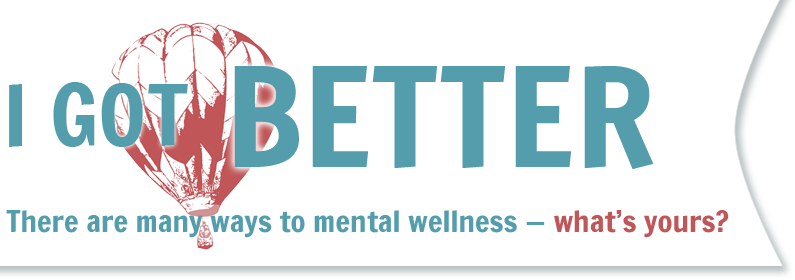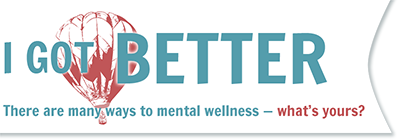More Than the Absence of Illness
Has a mental health provider ever told you that you could not reach a personal goal because of your psychiatric diagnosis (for example, education, career, independent housing, relationship, children, etc.)?
Most psychiatric professionals expressed such disdain and surprise at the goals I was achieving that I felt very diminished. I was frequently told how intelligent I was with a degree of amazement as if intelligence and emotional distress could not coexist. One psychiatrist, upon meeting me post qualification stated, “well, let’s put it this way, psychology and you don’t go very well together.”
If you overcame hopelessness that you could get better from a mental health or emotional problem, was there a turning point for you? My turning point was the realization that I had suffered a normal reaction to traumatic life events. I began to feel the same compassion for myself that I would have for another person in my situation. I realized that the pain I was suffering was shared by many others, and I was not alone. I began to respect the ways in which I tried to deal with the pain of trauma as being representative of the tremendous strength of my will to survive and not mere symptoms of mental illness. The great turning point was when I learned to transform these methods of psychological pain relief from ineffective, self-harm, into effective, self-nurturing. Perhaps the greatest turning point of all, for me, was discovering something outside myself that was, in a sense, bigger than me and that held meaning for me. I realized that there is so much suffering in this world because of lack of compassion and lack of justice: I began working as a social justice activist and to relish every day that I am alive and able to help.
If you could send a brief message to someone receiving mental health care today who is feeling hopeless about getting better, what would you say? You have within yourself all the conditions you need to feel happy and well; you just need to access them. Throughout history humans have experienced psychic pain. And throughout history humans have recovered from the overwhelm of that pain, and emerged stronger for having experienced it. I am one of them. You can be too.
Can you give examples showing you have gotten better from a mental or emotional problem, such as how you are doing well or accomplishing goals you have chosen? My guide to my own recovery from a series of traumatic life events is that I wake up in the morning and I look forward to getting out of bed. My life is meaningful to me and to others. I have a great deal of compassion for myself that enables me to take good care of myself physically and psychologically. I work professionally to help others who suffer psychological distress to work towards their own recovery, and I also work as an activist seeking justice and equality for others. I wouldn’t choose the traumatic experiences I have lived through, but without them I would not be living my life as it is today.
Most psychiatric professionals expressed such disdain and surprise at the goals I was achieving that I felt very diminished. I was frequently told how intelligent I was with a degree of amazement as if intelligence and emotional distress could not coexist. One psychiatrist, upon meeting me post qualification stated, “well, let’s put it this way, psychology and you don’t go very well together.”
If you overcame hopelessness that you could get better from a mental health or emotional problem, was there a turning point for you? My turning point was the realization that I had suffered a normal reaction to traumatic life events. I began to feel the same compassion for myself that I would have for another person in my situation. I realized that the pain I was suffering was shared by many others, and I was not alone. I began to respect the ways in which I tried to deal with the pain of trauma as being representative of the tremendous strength of my will to survive and not mere symptoms of mental illness. The great turning point was when I learned to transform these methods of psychological pain relief from ineffective, self-harm, into effective, self-nurturing. Perhaps the greatest turning point of all, for me, was discovering something outside myself that was, in a sense, bigger than me and that held meaning for me. I realized that there is so much suffering in this world because of lack of compassion and lack of justice: I began working as a social justice activist and to relish every day that I am alive and able to help.
Tell us what recovery means to you. How would you define recovery from mental health or emotional problems in your own words?
Recovery, for me, is first and foremost, healing from the devastating and all-encompassing psychic pain that is termed ‘mental illness’. As that pain eased, so too did the concomitant efforts to relieve that pain, that manifested as yet more symptoms of mental illness. But recovery is more than the absence of illness. My life now is meaningful, purposeful, and enjoyable. I am able to withstand a range of emotions without being overwhelmed by them. For me the most important aspect to recovering and to maintaining recovery is compassion: compassion for self, compassion for others, and compassion – and justice – for the world we are in so that we are able to leave it a little better because of our presence. Someone said to me recently: you used to be so thin and pale, you always dressed in black, you used to smoke so much and you were really very difficult to talk to. Now you are a joy to be with. I know what he meant; it used to be difficult for me to be me. It is a joy for me to be me now, and when it is not a joy I have the capacity to withstand whatever it is I am experiencing and know that it will pass.If you could send a brief message to someone receiving mental health care today who is feeling hopeless about getting better, what would you say? You have within yourself all the conditions you need to feel happy and well; you just need to access them. Throughout history humans have experienced psychic pain. And throughout history humans have recovered from the overwhelm of that pain, and emerged stronger for having experienced it. I am one of them. You can be too.
Can you give examples showing you have gotten better from a mental or emotional problem, such as how you are doing well or accomplishing goals you have chosen? My guide to my own recovery from a series of traumatic life events is that I wake up in the morning and I look forward to getting out of bed. My life is meaningful to me and to others. I have a great deal of compassion for myself that enables me to take good care of myself physically and psychologically. I work professionally to help others who suffer psychological distress to work towards their own recovery, and I also work as an activist seeking justice and equality for others. I wouldn’t choose the traumatic experiences I have lived through, but without them I would not be living my life as it is today.

